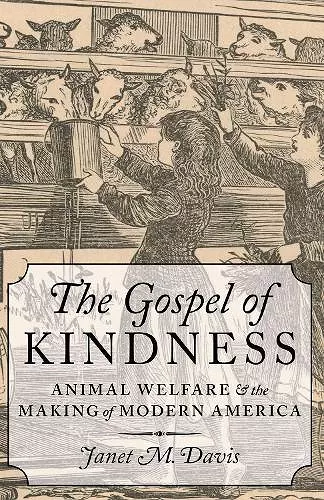The Gospel of Kindness
Animal Welfare and the Making of Modern America
Format:Paperback
Publisher:Oxford University Press Inc
Published:20th Feb '20
Currently unavailable, and unfortunately no date known when it will be back

When we consider modern American animal advocacy, we often think of veganism, no-kill shelters, Internet campaigns against trophy hunting, or celebrities declaring that they would "rather go naked" than wear fur. Contemporary critics readily dismiss animal protectionism as a modern secular movement that privileges animals over people. Yet the movement's roots are deeply tied to the nation's history of religious revivalism and social reform. In The Gospel of Kindness, Janet M. Davis explores the broad cultural and social influence of the American animal welfare movement at home and overseas from the Second Great Awakening to the Second World War. Dedicated primarily to laboring animals at its inception in an animal-powered world, the movement eventually included virtually all areas of human and animal interaction. Embracing animals as brethren through biblical concepts of stewardship, a diverse coalition of temperance groups, teachers, Protestant missionaries, religious leaders, civil rights activists, policy makers, and anti-imperialists forged an expansive transnational "gospel of kindness," which defined animal mercy as a signature American value. Their interpretation of this "gospel" extended beyond the New Testament to preach kindness as a secular and spiritual truth. As a cultural product of antebellum revivalism, reform, and the rights revolution of the Civil War era, animal kindness became a barometer of free moral agency, higher civilization, and assimilation. Yet given the cultural, economic, racial, and ethnic diversity of the United States, its empire, and other countries of contact, standards of kindness and cruelty were culturally contingent and potentially controversial. Diverse constituents defended specific animal practices, such as cockfighting, bullfighting, songbird consumption, and kosher slaughter, as inviolate cultural traditions that reinforced their right to self-determination. Ultimately, American animal advocacy became a powerful humanitarian ideal, a touchstone of inclusion and national belonging at home and abroad that endures to this day.
Enrich[es] our understandings of human-animal relations in American history, as well as force[s] us to revisit and reconsider larger historiographical assumptions about agency and causation....[Davis] deftly weaves the history of animal welfare in with that of other social movements in the late nineteenth and early twentieth centuries....Davis's final three chapters...are her most pathbreaking, for they move beyond the U.S. frame and put American animal advocacy in conversation with global dialogues about our young nation's empire taking place first in the Philippines, Cuba, and Puerto Rico under U.S. military occupation, and later in India and Spain via Protestant missionaries. Here, Davis is particularly skillful at synthesizing existing animal studies and global histories with her own close readings of animal advocacy texts. * Karen A. Rader, American Historical Review *
Davis, associate professor of American Studies at University of Texas-Austin, combines extensive research, excellent scholarship, and clear, engaging prose to produce a valuable addition to the histories of American nineteenth-century reform, imperialism, women's activism, and animal welfare. * Lynn M. Lansdown, Journal of American Culture *
The Gospel of Kindness goes much further to expose the heretofore unexamined animal dimensions of American citizenship and civilization. * Andrea L. Smalley, The Journal of American History *
If you only read one book this summer, make it this one. * Equus Magazine *
The Gospel of Kindness brilliantly chronicles the growth of American animal protectionism from the Civil War to the onset of World War II. Janet Davis examines shifts in the concern for the treatment of animals in the context of the great social movements of the 19th and early 20th centuries-Protestant revivalism, the abolition and temperance movements, and international expansionism. From the origins of urban animal shelters to conflicts over bullfighting in Texas, this is the definitive history of an important yet neglected chapter in the development of the animal welfare movement in the United States. * Hal Herzog, author of Some We Love, Some We Hate, Some We Eat: Why It Is So Hard To Think Straight About Animals *
A breakthrough work in historical scholarship concerning the humane movement and concern for animals. Davis forges new ground in her illumination of a transnational animal protection ethic and her analysis of its meaning and significance both within and outside the United States. The Gospel of Kindness is a work of tremendous relevance for a contemporary world in which animal protection values are spreading more deeply and ever farther. * Bernard Unti, author of Protecting All Animals: A Fifty-Year History of The Humane Society of the United States *
The Gospel of Kindness shows how champions of animal welfare in the United States repeatedly framed their advocacy within the language of US benevolence and uplift. Well-written and thoroughly researched, Davis's fine history of the US animal protection movement, global in scope, illuminates the contested politics of empire, citizenship, gender, race, and religion. * Emily S. Rosenberg, author of Transnational Currents in a Shrinking World, 1870-1945 *
- Winner of ^ICHOICE^R Outstanding Academic Title, 2017 Winner of the Presidents' Book Prize of the Society of Historians of the Gilded Age and Progressive Era.
ISBN: 9780190092443
Dimensions: 236mm x 155mm x 23mm
Weight: 476g
320 pages